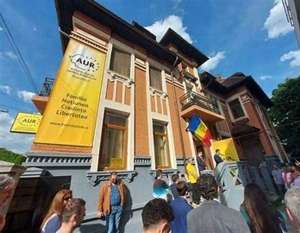The area of the Black Sea"s continental shelf which was in dispute in Hague between Ukraine and Romania, contains large deposits of gas and crude oil. Bogdan Găbudeanu, president of the National Mineral Resources Agency (ANRM), issued the following statement: "Neither Ukraine, nor Romania undertook serious geological surveys in the area in dispute. The agency has some preliminary estimates for the entire surface in dispute of some 12.000 square km, which indicate the existence of some structures with a total of 100 billion cubes of natural gas and some 10 million tons of oil. But we will only be able to explore 25-30% of that, if the circumstances are good".
MR. Găbudeanu explained that these estimates were obtained by extrapolating on older research at the Muridava and Cobălcescu oil wells. Exploration activities provide data on the resources which can actually be exploited commercially. The president of the ANRM said: "Drilling must be done at 2500 meters below sea level. This makes exploration extremely expensive, and it could take 10-15 years to get worthwhile results. The auctioning of the perimeters will take about a year, including selecting the best bids. The explorations take on average, 4-5 years before they yield any visible results. Therefore it could take as much as ten years for a perimeter to enter production".
According to data by the ANRM, deep sea exploration expenses can go to as much as some 40-50 million dollars per oil well. In case the exploration yields good results and new deposits are found, development expenses can reach as much as hundreds of millions of Euros.
For deep sea drilling, companies have to use submersible gear, that Romanian companies do not have, at the moment. Oil companies currently explore and exploit crude and gas deposits at less than 80 meters of depth.
• The first real advantage of the EU accession: We are allowed to exploit gas on
Serpent Island
The International Court of Justice in Hague, yesterday unanimously ruled that the border of the continental shelf of Romania and Ukraine will follow a 12 nautical miles arc around Serpent Island. The verdict recognized Romania"s rights arising from its lawsuit against Ukraine on the delimitation of the continental shelf, by announcing that Serpent Island does not influence the border line, as this formation is itself entitled to just 12 nautical miles of territorial waters. More to the point, Serpent Island, will not be considered as being part of Ukraine"s coastline, as requested by Kyiv.
At the same time, by only giving Serpent Island a territorial sea of 12 nautical miles, the court has determined that the former is a rock, like Romania claimed, as opposed to Ukraine"s claim that it was a full-fledged island and as such it would be entitled to more than 12 nautical miles of maritime territory.
The chairman of the ICJ, Rosalyn Higgins, said that Serpent Island can not be considered a basic point and can not play a role in determining the separating line. The verdict of the ICJ sets a border which is defined by clear geographical coordinates, and which will be used in determining the continental shelf and the exclusive economic zones of Romania and Ukraine.
Romania"s agent at the ICJ, Bogdan Aurescu, said at the end of the solemn session where the ruling was read, that the verdict is "favorable" for Romania. He said: "It is a clear and fair solution and which leaves no room for interpretation, and allows access to the hydrocarbon deposits in the area". According to Bogdan Aurescu, the verdict recognizes Romania"s right to exploit an exclusive economic area of 9700 square kilometers, that is 79,34% of the 12000 square kilometer area which was the object of the dispute. The area delimited by the line traced by the Court is estimated to contain some 70 billion cubic meters of gas and 12 million tons of crude oil.
"I think we can say that we have reached our goal", Mr. Aurescu said, who also mentioned that the ruling is binding, final, and immediately applicable, without any need for any further formalities, either in Romania, or in relation with Ukraine.
Serpent Island lies in the Black Sea, 45 km off Sulina (Romania) and some 50 km of the Ukrainian coast. It was taken over by the USSR at the end of WWII. Yesterday"s verdict ended a trial which began in 2004, following Romania"s complaint.
After announcing the ICJ decision, the appropriate marking of the territory follows, according to the geographical coordinates found in the Court"s ruling, Foreign Affairs Minister Cristian Diaconescu said yesterday. He further said: "The area will be appropriately marked. There are several categories of rights and obligations that each party has, according to the distance from the shoreline, after which the marking will be made based on the latitude and longitude coordinates found in the ICJ decision. Starting with passage rights of the ships and including the exploitation rights ".Mr. Diaconescu said "we have to be cautious and prudent when it comes to encouraging talks about exceptional exploitation in that area, as no detailed explorations were made".
Ukraine said that it is satisfied by the "wise compromise" of the ICJ. Oleksandr Kupchyshyn, Ukraine"s agent at the ICJ, said that, "as of now there are no more disagreements between Romania and Ukraine". However, when asked on who won, Kupchyshyn said: "Nobody. In fact, no one and everyone won".
Domestic company "Petrom" SA is pondering the possibility of leasing several perimeters put up for auction by the National Agency for Mineral Resources, including the perimeters found on the continental shelf in the Black Sea region, according to NewsIn. "Romgaz" and "LUKoil Romania" are also interested in said auctions.
The Govenrment will elaborate a strategy for the exploitation of the hydrocarbon resources which were allotted to Romania. "The ruling of the ICJ allows us to proceed with the steps required for direct exploitation of the hydrocarbon resources found in the area previously in dispute, which we have won", the Bucharest Government announced.


























































